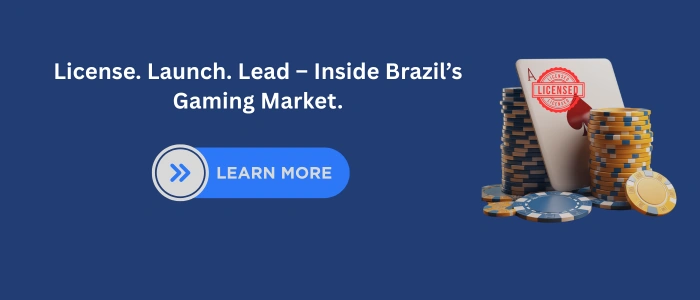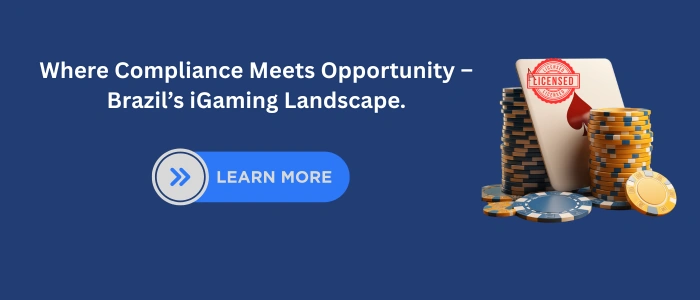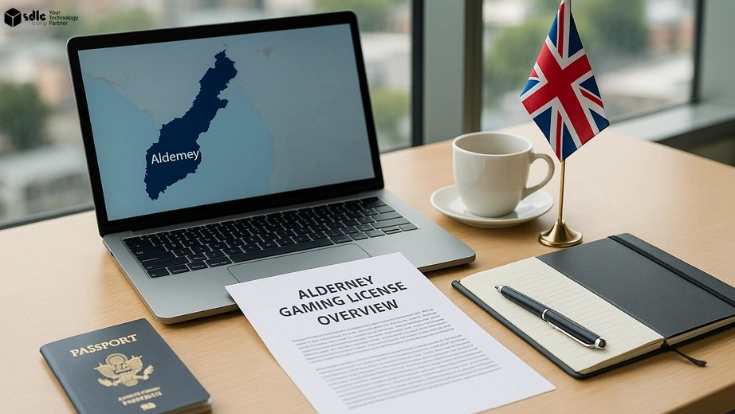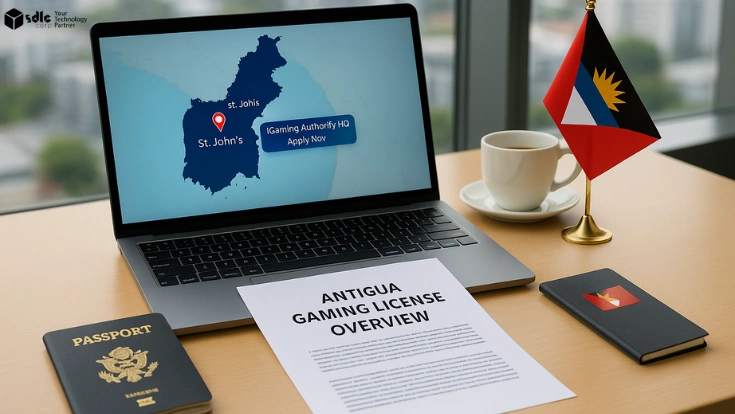Introduction
Brazil is experiencing a significant shift in its approach to gambling. For years, betting was tightly controlled. Today, that stance is changing. This change has introduced new opportunities for legal online gambling in Brazil. With the rise of digital betting platforms and increasing demand for regulated play, the government is working to build a stable and transparent system.
Understanding the Brazil iGaming regulation is essential for operators, investors, and even casual bettors. Legal certainty is important. So is knowing how the system works—from licensing to tax requirements. This blog offers a clear view of current and upcoming changes in Brazil online gambling laws, what licenses are required, and how to stay compliant within the iGaming legal framework in Brazil.
Explore how Sweden is handling its online gaming policies in our guide to the Sweden Gaming License.
The Evolution of Gambling Laws in Brazil

Gambling laws in Brazil have historically been strict. Until recently, most forms of gambling were banned under the 1941 Criminal Contravention Act. For decades, only horse racing and government-run lotteries were allowed.
Change began with Law No. 13,756/2018. It authorized fixed-odds sports betting. However, regulation and licensing remained incomplete. Only in 2023 did the Brazilian government pass new measures that created a clearer regulatory structure. These laws now guide Brazilian sports betting regulation and broader iGaming activities.
The shift wasn’t just about updating policy. It was about recognizing the rise of digital platforms and responding to market needs. Brazil had already become a major gambling market, just without oversight. Regulators stepped in to formalize the space, ensuring both safety for users and tax revenue for the state.
Compare Brazil’s legal evolution with the Netherlands Gaming License framework.
What Is Regulated Under Brazil iGaming Law?

Under the current Brazil iGaming regulation, the focus is primarily on sports betting and online gambling. This includes fixed-odds betting, online casinos, virtual sports, and fantasy games. The new regulatory regime treats these as legal if operators meet the licensing and compliance standards set by the Ministry of Finance.
The legal structure now acknowledges online gambling as a legitimate industry. It is no longer in legal limbo. As a result, operators can now apply for a Brazil gaming license to run these services in the country.
In short, regulated activities include:
- Fixed-odds sports betting
- Online slot machines
- Online table games
- Live dealer games
- Virtual sports
- Peer-to-peer gaming platforms
However, all forms of luck-based games that are not included in the framework remain restricted unless specifically permitted.
Learn what’s covered under the Alderney Gaming License and how it compares to Brazil’s framework.
Understanding the Brazil Gaming License
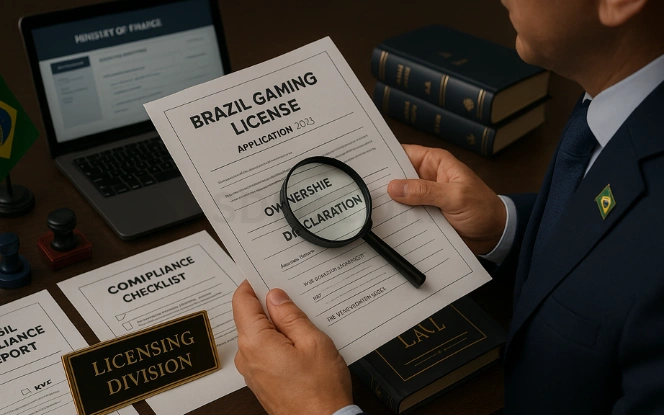
Operators wanting to legally offer gambling services must obtain a Brazil gaming license. The license is granted by the Ministry of Finance, which oversees gambling regulation through a new secretariat.
The licensing process requires proof of financial stability, technical standards, and security compliance. Operators must also maintain a Brazilian legal representative and open a local office. The fee for a license is substantial, and licenses are valid for five years.
Criteria for a Brazil gaming license include:
- Demonstration of corporate structure
- Anti-money laundering systems
- Responsible gambling protocols
- Secure payment systems
- Full audit trail for user activity
The government wants to attract serious operators. Therefore, these rules promote market integrity while protecting players. They also allow Brazil to earn significant tax income.
Review licensing needs in other jurisdictions such as the Kahnawake Gaming License.
Taxation and Financial Rules for Operators

One key goal of the Brazil iGaming regulation is ensuring fair taxation. The new system imposes a 15% gross gaming revenue (GGR) tax on operators. This means companies pay 15% of all gambling revenue after player winnings.
Players are also subject to income tax on their winnings above a set threshold. Operators are responsible for reporting and withholding these taxes. Compliance requires robust reporting systems and cooperation with the Brazilian tax authority.
To maintain transparency, operators must:
- Submit financial reports quarterly
- Report suspicious transactions
- Disclose ownership structures
- Maintain segregated player accounts
Failure to comply may lead to license suspension or fines.
Want to understand how tax plays a role in online betting? Visit our Complete Guide to Casino SEO to see marketing compliance aligned with regulation.
Ensuring iGaming Compliance in Brazil

iGaming compliance Brazil is about following local laws and meeting technical and financial requirements. Operators must use approved software, store data locally, and provide real-time reporting to regulators.
Compliance also includes user protection. Operators must offer responsible gaming tools, including deposit limits, time-outs, and self-exclusion. In Brazil, user protection is a key pillar of the new legal framework.
Other compliance factors include:
- Secure login and user verification (KYC)
- Anti-fraud and anti-money laundering controls
- Customer support in Portuguese
- Data privacy per Brazil’s LGPD law
This regulatory shift prioritizes safe gaming environments and legitimate market practices.
See how global operators manage compliance through AI in our post on AI for Small Business.
The Role of Brazilian Sports Betting Regulation
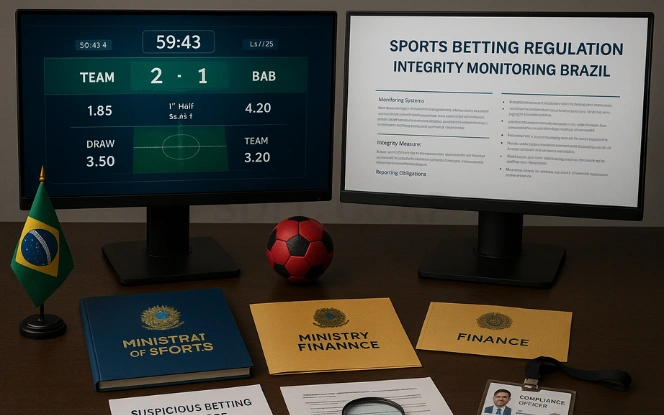
Brazilian sports betting regulation is central to the iGaming system. Sports betting was the first vertical to be legalized and serves as the testbed for broader gambling laws.The regulation allows both online and retail betting. Licenses are required for both forms. Bookmakers must use real sports data, and the government has outlined rules for integrity monitoring. These ensure that games are not manipulated and that betting remains fair.
Operators must form partnerships with data providers, invest in monitoring systems, and alert regulators to any suspicious activity.
Notably, sports betting regulations require:
- Publishing betting odds transparently
- Monitoring unusual betting patterns
- Offering odds based on certified data
- Blocking underage users from accessing services
This framework ensures Brazil’s sports betting market remains credible, legal, and fair.
Check out our coverage of the Antigua and Barbuda Gaming License to compare regulatory depth in other island jurisdictions.
Building the iGaming Legal Framework in Brazil
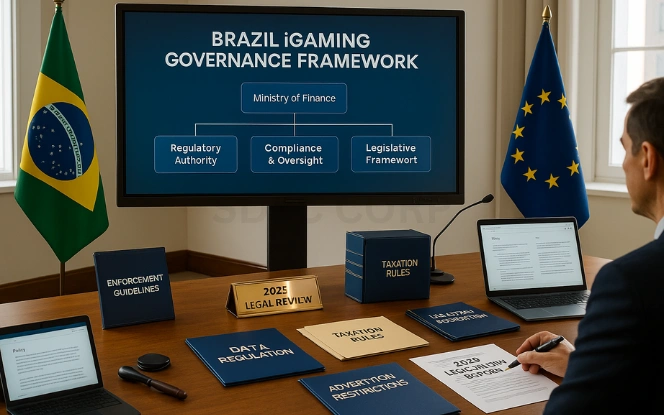
The iGaming legal framework in Brazil is still growing. The 2023 updates lay the groundwork for long-term development. They outline who can operate, what services are allowed, and how data and payments are handled.
The legal framework also assigns roles to regulators and enforcement agencies. The Ministry of Finance is in charge of licensing and oversight, but other authorities help with data, finance, and consumer rights. Together, they create a multi-layered system.
Key components of the iGaming legal framework:
- Regulatory oversight by federal authorities
- Legal structure for foreign and domestic companies
- Defined tax rules for operators and players
- Clear player protection guidelines
- Transparency mandates for transactions and advertising
This legal clarity is encouraging foreign investment and helping domestic firms scale in a trusted environment
Challenges and Risks in Brazil’s iGaming Market
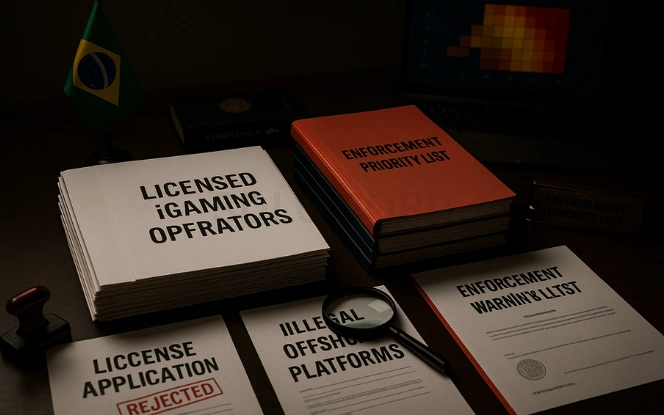
Even with regulations in place, the Brazilian iGaming market faces several challenges.
Unlicensed Operators: Many offshore platforms still target Brazilian users without licenses. This puts users at risk and undermines local tax collection.
Consumer Trust: Brazil’s long-standing gambling ban created mistrust. Operators must work to show they follow legal and ethical practices.
Payment Restrictions: Financial institutions have hesitated to process gambling transactions. New rules aim to fix this, but change will take time.
Regional Enforcement Gaps: Regulation is national, but enforcement can be uneven across states. Operators must monitor how rules are applied locally.
These risks highlight why legal licensing and iGaming compliance Brazil are so important. Without them, the market risks becoming unstable or dangerous for users.
Want more insight on tackling platform trust issues? Read about How to Ensure Compliance with Global Gambling Regulations?
The Future of Brazil iGaming Regulation
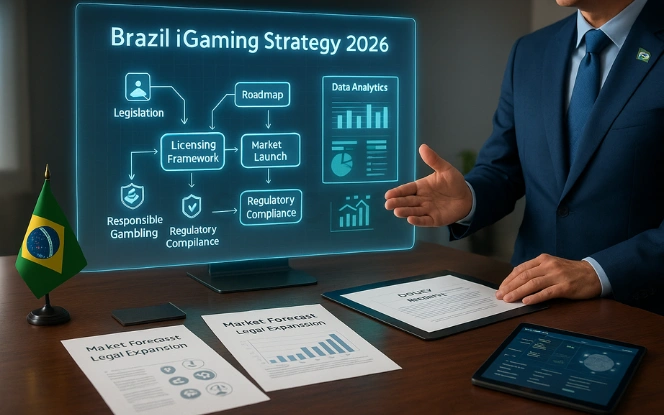
Brazil is on a path to becoming one of the world’s most important iGaming markets. Its population, digital connectivity, and love for sports make it ideal for growth. The legal changes so far show clear intent from lawmakers to build a structured market.
Future regulations will likely expand to include more gambling types, possibly allowing online poker and other skill-based games. There may also be stricter rules on advertising and international partnerships.
Investors, developers, and operators should monitor these developments closely. As more regulations are finalized, the Brazilian market will become even more attractive, but only for those prepared to follow the rules.
Curious about what’s coming next in digital gaming? Explore How AI in Gaming is Redefining the Future of the Industry
International Operators: Entering the Brazilian Market
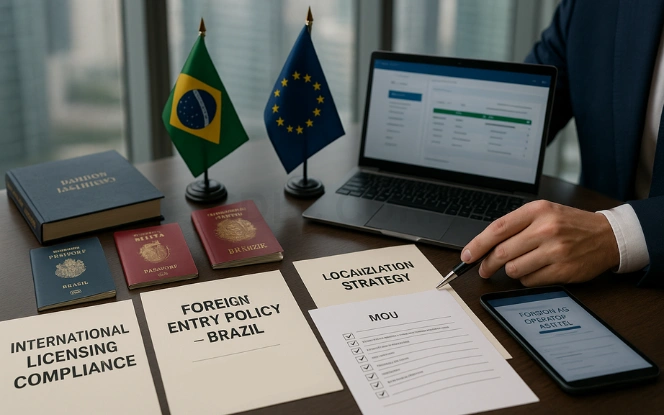
Global iGaming firms see Brazil as a major opportunity. The country’s size and legal reforms create ideal conditions for entry. However, securing a Brazil gaming license and setting up operations takes preparation.
International operators must localize their platforms, understand local user behavior, and ensure full compliance. They also need partnerships with local banks, legal teams, and regulators.
Success depends on:
- Understanding the legal framework
- Investing in compliance systems
- Hiring local staff and legal advisors
- Registering with the Brazilian tax authority
Entering Brazil’s iGaming market can be profitable—but only with the right strategy and full compliance with the Brazil iGaming regulation.
Conclusion
Brazil’s decision to regulate online gambling marks a turning point for both users and operators. The government has created a system based on transparency, compliance, and protection. This allows legitimate companies to operate while shielding players from risk.
Understanding the Brazil iGaming regulation means knowing the laws, licensing process, and responsibilities tied to compliance. For any company aiming to enter this space, aligning with the iGaming legal framework in Brazil is not optional, it’s essential.
Regulation brings stability. It allows innovation without chaos. And it sets a foundation for long-term growth in one of the most promising iGaming markets in the world.
Contact us SDLC Corp to learn how we can support your entry into Brazil’s regulated iGaming industry, from legal insights to platform development and compliance support.
FAQs
What Is the Current Status of Brazil iGaming Regulation?
Brazil has legalized certain forms of online gambling, including sports betting. New laws passed in 2023 regulate licenses, taxes, and operations.
Who Issues the Brazil Gaming License?
The Ministry of Finance issues gaming licenses in Brazil. Operators must meet financial, legal, and compliance standards.
What Is Covered Under Brazilian Sports Betting Regulation?
Brazilian sports betting regulation includes both online and land-based betting. It covers odds transparency, match integrity, and age restrictions.
What Are the Tax Rules for Operators in Brazil?
Operators are taxed 15% on gross gaming revenue. They must also comply with income tax reporting on player winnings.
How Can Foreign Companies Operate in Brazil’s iGaming Market?
Foreign companies must localize their services, hire local legal representation, and apply for a Brazil gaming license to operate legally.

